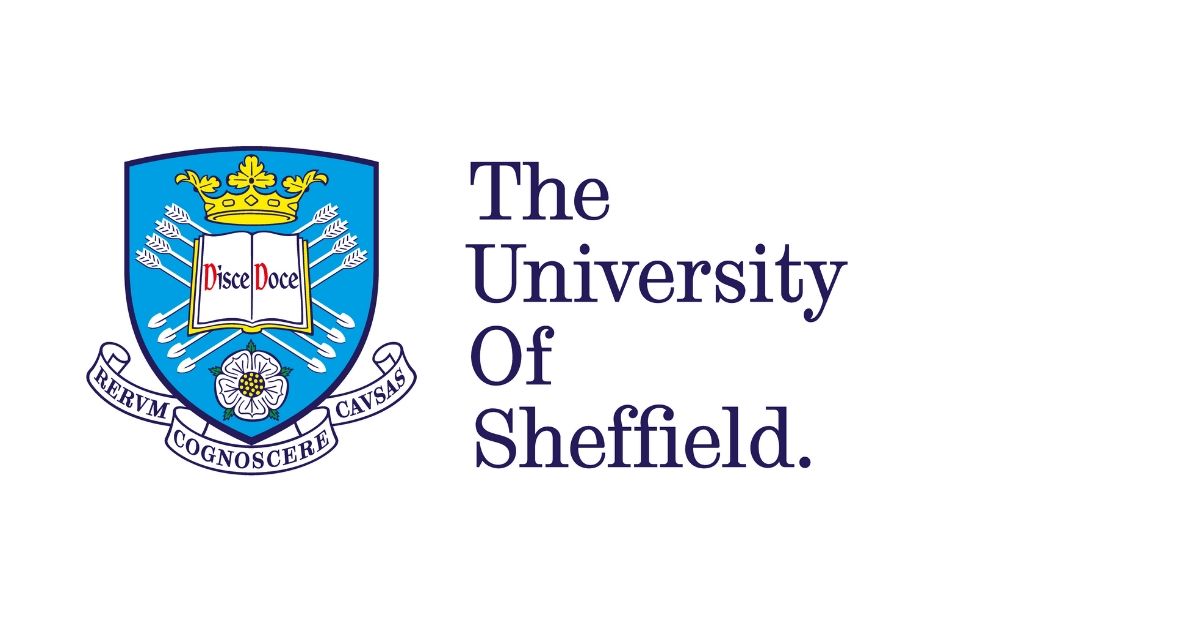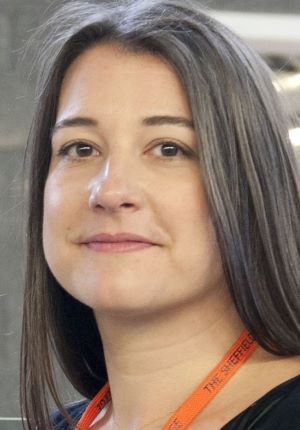
The University of Sheffield is an exciting place to be right now. The IT department – or Corporate Information & Computing Services (CiCS) – is central to it all, supporting virtually every process and person at the University. Director of IT, Bella Abrams, spoke to us about ambitious research, fighting cyber criminals and working with Sheffield’s digital community to make really awesome things happen.
An evolving IT team

The University’s IT team is a big digital employer in Sheffield, and it has a big remit to match. This includes face-to-face student support, an IT helpdesk and managing the University’s corporate systems, such as human resources and finance.
Perhaps less obvious is the team’s role in supporting research, running incredible levels of calculation on high performance computers. Bella explains,
“On the one hand, we might be contributing to helping someone find a cure for motor neurone disease (not that we’ve done that yet – but we might!), and on the other, we might be helping a student to access the wifi. We have a very wide remit!”
Bella joined the University in January 2019, taking the lead of a 160-strong team. Describing her staff as “all completely brilliant”, she is leading the team through a period of change as they evolve and adapt to a very different learning environment. She comments,
“We have a new challenge; the University wants different things from us so we are going through a big set of changes. Our new Vice Chancellor is very technically literate, which is great. He wants the University to invest in how it consumes IT and how it can take us forward strategically; to improve students’ services and to develop our online platform and tools.”
Bella also has ambitious plans when it comes to what her team does, and how they are perceived. She is particularly excited about the vital role the IT department will play in the University’s research. A high priority is supporting its four new Research Flagships, which promise to tackle some of the world’s biggest problems. These include an Energy Institute and an Institute for Sustainable Food. She explains,
“Supporting the Research Flagships is a big part of what we will be doing, not just as enablers, but as critical partners in the process. We’ve got a brand new research IT strategy which will have a team of computer research scientists helping the researchers to craft the data sets they need and running them through high performance computers in our data centres.
“We’re going to be recruiting to new research support roles, as well as investing in our infrastructure so that we can deliver platforms that enable us to consume all of the data. Altogether, I predict our team will grow by about 25%.”
Looking outwards and inviting people in
The learning culture at the University of Sheffield has been a driver behind Bella’s decision to join Sheffield Digital. She recognises the deep pool of expertise and knowledge that exists in the city’s digital community and is keen to both learn from and contribute to this.
“We wanted to join Sheffield Digital to learn from people in the city; to look outwards at what exciting things people are doing in Sheffield and beyond. I’d like to encourage meet-ups with those who have done big change projects before, to get advice and hear about what they did. We’re really interested in using Agile, Dev Ops and Continuous Delivery to develop some of our services, so having that experience in the city – and being able to share it – is important to us.”
Recognising that user expectations are changing, Bella wants to explore the technical expertise in the city to help the University improve its services.
“We are delivering to 30,000 students and 8,000 employees, so getting UX and service design right is incredibly important, and we’ll be looking to the city’s digital agencies and experts for this. We want to understand what skill sets people have, things they’ve done and things we can learn from them.”
Cyber security is a “sky-high priority” for Bella and her team. As part of critical national infrastructure, and with complex business models, universities are exceptionally vulnerable to cyber criminals – as vulnerable as government departments. Bella wants to engage with the digital community on cyber security, to develop her team’s learning with the help of the many different perspectives the community has to offer.
“We have a different view on cyber than, say, a software company. We’re a consumer and our aim is to stay safe. We want to learn from people who build software, but also from people who have to keep their user community informed. That’s the biggest thing for us, keeping our users aware constantly that somebody is always trying to steal stuff.”
For Bella, integrating the University’s IT department within Sheffield’s digital community is also about identifying itself as a digital team, with something to say and lots to share. With plans to host meet-ups at the University, Bella is keen to share the team’s expertise, learn from peers and contribute to the growth of digital in Sheffield. She comments,
“One of the best things about coming to work here was realising all of the amazing things we do – the University and our team. I want to shout about this! I’m going to be loud about wanting to do things differently and wanting to be a big part of how digital works in the city.
“The University is a massive asset to Sheffield, but so is the digital community. So, bringing those two things together, building products and services together, will be really awesome.”
Doing things differently
Bella is passionate about technology and learning and is particularly interested in making IT an accessible career choice for all. She is proud of her diverse team and, since joining, has implemented different ways of working to make the department an attractive and accessible place to work.
Bella encourages flexible working, to encourage women to return to work after having children, but also to make retraining in IT an attractive option to all. She explains her approach:
“I want to create an environment where we attract the best people. Flexi-working encourages women to think about the jobs that they might not have considered doing, and it also encourages new dads, for example, to think about it as well.
“Also, working in infrastructure involves sometimes working at night and over weekends. I want a culture where that isn’t just assumed, and people can get their hours back. It’s important that people are not penalised for wanting to do things a bit differently.”
Whilst acknowledging that Sheffield’s Women in Tech (ShfWIT) scene is slightly behind that of larger cities such as Manchester – where there are many more women in senior IT roles – Bella is confident that things are moving in the right direction.
“The fact that we have ShfWIT with regular meet-ups, and is something we all think is important in the city, is really encouraging. There are other groups in the University as well which is also a really good sign.
“Focusing on women in tech is about a culture in IT. I’ve been really lucky to have mostly worked in well-balanced teams but you can work in offices where you are the only woman and things like the level of conversation can be very different. ShfWIT is creating a supportive environment for women at any stage of their careers to share experiences and to find role models who have started out in many different ways.”
Describing diversity as being a ‘hot topic’ right now, Bella is confident that more employers are seeing that a diverse team is more efficient and effective and one that can respond well to new ways of working. It’s clearly an ethical and moral choice as well – which is really important when working in a University. However, she knows there are still barriers preventing many people from working in IT roles.
“Teams should reflect the cities they exist in, and Sheffield is a very interesting, diverse city, but with a clear split down the middle. Young people growing up in the north east of the city probably don’t have access to adults working in IT and tech roles, so how do they aspire to that kind of career? Who do they learn from and ask questions?”
Bella is tackling this issue head on, introducing apprenticeships to her team and working with Longley Park Sixth Form College to mentor students, offer paid internships and deliver workshops on interview preparation. She is championing the message that young people from less affluent areas should aspire to study at the University, and should aspire to have a career in IT, without having to take the traditional routes in.
“Equality and diversity isn’t just about middle class white women saying we want to be paid the same as blokes; it’s about saying IT should be a career that is open to all. What’s really important is creating an environment where you can access people’s experience and their stories regardless of where you grow up. This is something that Sheffield Digital and the University of Sheffield can do together really effectively – especially if we ask ourselves some tough questions about how diverse we really are and really want to be. We should also work with other groups in the city who feel that they aren’t being represented effectively or listened to. I really want to work with companies that recognise diversity isn’t just a checkbox.”
Supporting a transformation
Bella is looking forward to articulating an IT strategy that helps everyone in the University to do what they need to do. She explains,
“An IT strategy isn’t relevant to the rest of the University. For them, it’s: ‘Can I offer an amazing teaching and learning experience? Can I do that in a digital way that helps students to better engage with their learning? Can I access data platforms in order to improve my research? Is it easy to do that? Can I use collaboration tools to be as creative as possible? Do we pay our suppliers on time? Are HR and corporate systems easy to use?’ Answering yes to all of these questions is exactly where we need to be.
“In the long term, our work can effect genuine change, through data and research, delivering academic programmes in different ways and being ready for the many different ways that digital technologies will change education.
“The IT team can do wonderful things for the University, and the University already does wonderful things. If we bring those two things together, it will make the greater sum of our parts even better.”